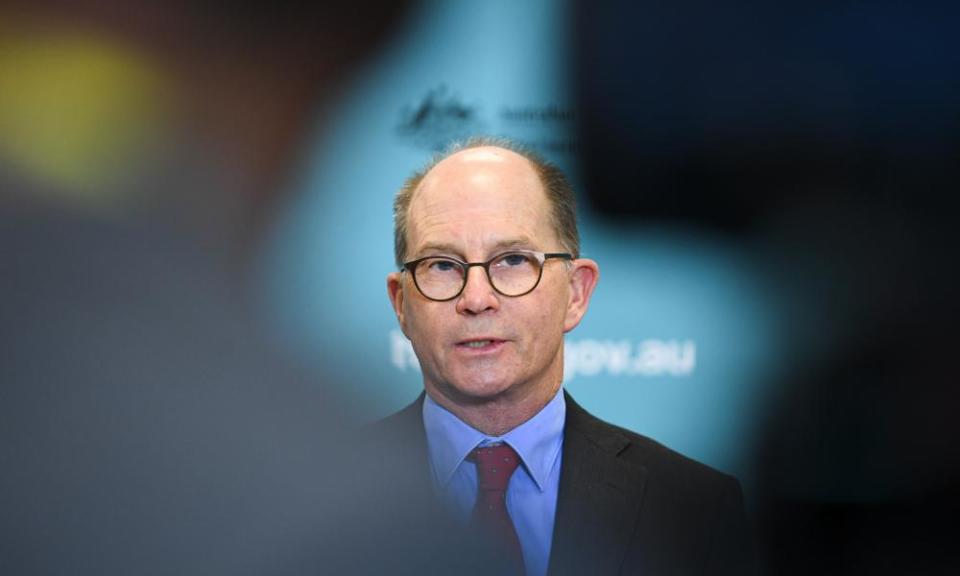Reopening Australia's border will be 'one of the last things to change', says chief medical officer

Australia’s chief medical officer, Prof Paul Kelly, has said that even when the coronavirus vaccine is rolled out “international borders will be one of the last things to change”.
Kelly on Tuesday said the criteria for when the country’s international borders could be reopened was “a very dynamic space”. “On travel, we have to be very careful … the first vaccinations, as they roll out in a few weeks in Australia, will not change everything back to normal,” he told reporters in Canberra.
The chief medical officer said Australia was in “an envious position at the moment compared with the rest of the world” but “unfortunately, international border changes will be one of the last things to change, rather than the first”.
Related: Global Covid report: China and WHO criticised for early mistakes; US urges more Wuhan access
The federal health department secretary, Prof Brendan Murphy, said on Monday that international travel would be unlikely to resume in 2021, triggering concern from the tourism industry.
Kelly also commented on findings from the second progress report from the Independent Panel for Pandemic Preparedness and Response, which is conducting an investigation into the virus for the World Health Organisation.
The report stated: “What is clear to the panel is that public health measures could have been applied more forcefully by local and national health authorities in China in January.”
“It is also clear to the panel that there was evidence of cases in a number of countries by the end of January 2020. Public health containment measures should have been implemented immediately in any country with a likely case. They were not.”
Kelly on Tuesday said the delay in notifications about the virus from China was an issue identified early on in the pandemic.
“So getting to work out why that was the case and what we can do to improve into the future would be the key there,” he said. “While there is criticism of China at that time, I think there is also a lot we can learn from the Chinese response, they had a terrible situation there which they have been able to come through.”
Asked how high the vaccination uptake would need to be in Australians for borders to reopen, and whether vaccination would also mean changes to hotel quarantine, Kelly said he would not speculate and that these were among the criteria for reopening still under discussion.
“It’s a very dynamic space,” he said.
“Large and effective rollout of vaccination would increase our protection which would be of value. We are seeing in some countries that have rolled out vaccinations in recent weeks a drop in the number of cases they are seeing, especially in Israel, [where] we are already seeing a significant decrease in hospitalisation.
“Vaccination will play a part in this wide range of information we look at to make those assessments.”
Related: 'At the coalface': what the Australian expert in WHO's Covid mission in China hopes to find
Kelly said initially Australia’s vaccination program would be run out of the major hospitals. The government would then look at expanding the availability of vaccines, most likely by increasing the supply of the Oxford University/AstraZeneca vaccine because, unlike the Pfizer vaccine, it does not have to be stored at -70C, making distribution easier.
The government was in discussions with groups representing general practitioners including the Australian Medical Association to discuss how a more general rollout would work once the most vulnerable had been vaccinated in hospitals, he said.
On Monday, Norway reported 30 deaths and side effects in elderly people after being given the Pfizer vaccine. A statement from Australia’s drugs regulator, the Therapeutic Goods Administration, said the deaths were out of 40,000 people who received the Pfizer vaccine. The TGA said the deaths were recorded among very frail patients, including some who were anticipated to only have weeks or months to live.
“Norwegian authorities report that in recent years in aged care an average of around 400 deaths typically occur each week,” the TGA said.
Kelly said this context was important. It was also why Australia did not want to rush a vaccine rollout and wanted to wait to analyse the full data from elsewhere, he said.
“The TGA is in direct conversation with its counterparts in Norway and in the European medicines authority about these matters.
“So this has to be put in the context of what has happened after people have received vaccines, that needs to be looked at very carefully, and the TGA will take that information into account in their assessment in the coming days and weeks.”

 Yahoo Finance
Yahoo Finance 